Republicans, Democrats running for Arizona Corporation Commission give stances on key issues
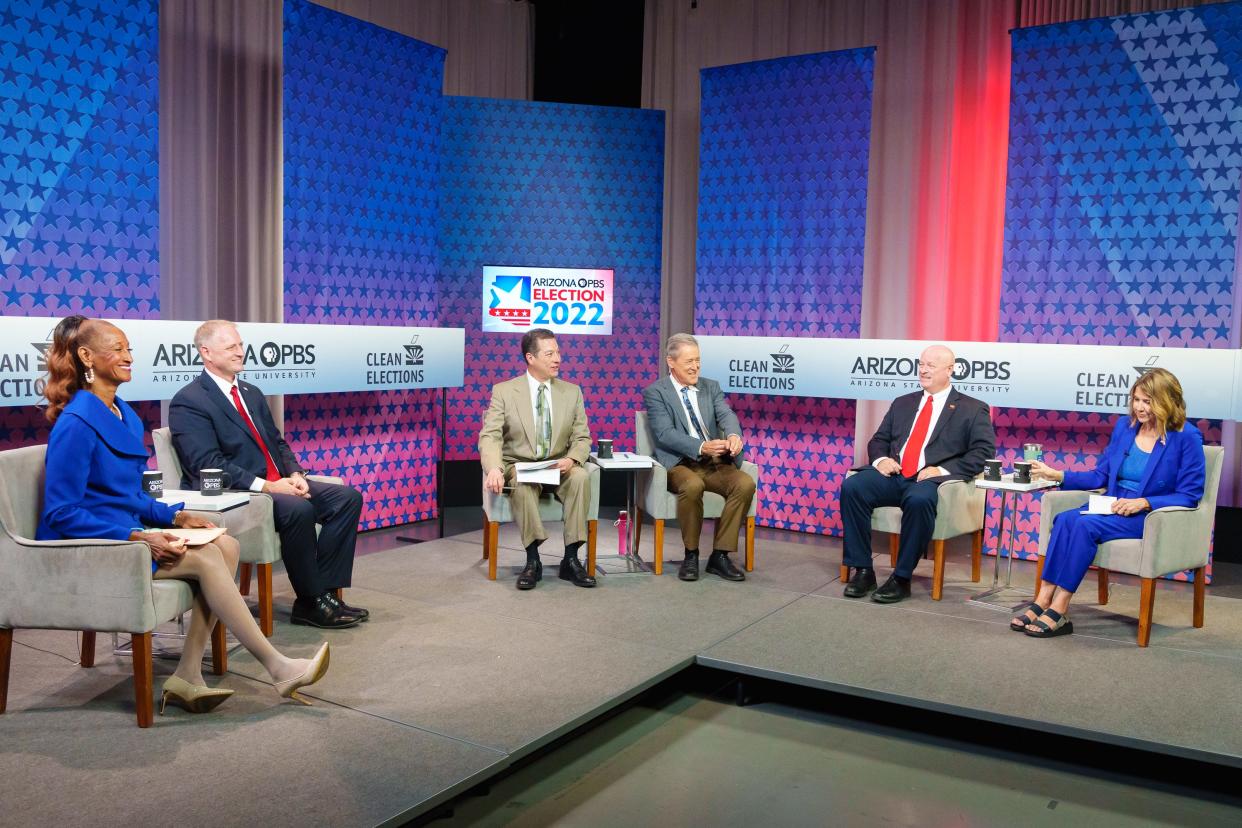
- Oops!Something went wrong.Please try again later.
The Arizona Republic sent policy questions to candidates running for the Arizona Corporation Commission to help voters understand their views as they relate to this important state office.
Two of the five seats on the commission are on the November ballot, and there are two Republicans and two Democrats in the race.
Republicans Nick Myers and Kevin Thompson chose to answer the questions together.
Myers is a policy advisor to Commissioner Justin Olson, who is leaving office. Myers has experience dealing with commission issues through a prolonged dispute with the notorious Johnson Utilities water and sewer company in the far east valley.
Thompson is a Mesa councilman who previously worked as a lobbyist for Southwest Gas Corp., one of the larger utilities regulated by the Commission.
Democrats Sandra Kennedy and Lauren Kuby answered individually.
Kuby, until recently, served as a Tempe councilwoman. She works at Arizona State University managing the Stardust Center for Affordable Homes and the Family, and where she also has the title of Senior Global Futures Scientist at ASU’s Julie Ann Wrigley Global Futures Laboratory.
Kennedy is a former state lawmaker seeking a second term on the Commission. Kennedy also served a term from 2009-2012.
The Corporation Commission sets rates and policies for utilities like Arizona Public Service Co. It also oversees pipeline safety, railroad crossings, securities investments and other duties.
Renewable energy
Question: It's already established that the Democrats in this race believe in setting renewable energy requirements for utilities while the Republicans oppose such mandates.
Can you state whether the use of natural gas for such a substantial portion of Arizona’s electricity is a problem, and why or why not? If it is a problem in your belief, what should Corporation Commissioners do about it, if anything? (Natural gas provided 43% of Arizona’s electricity in 2021).
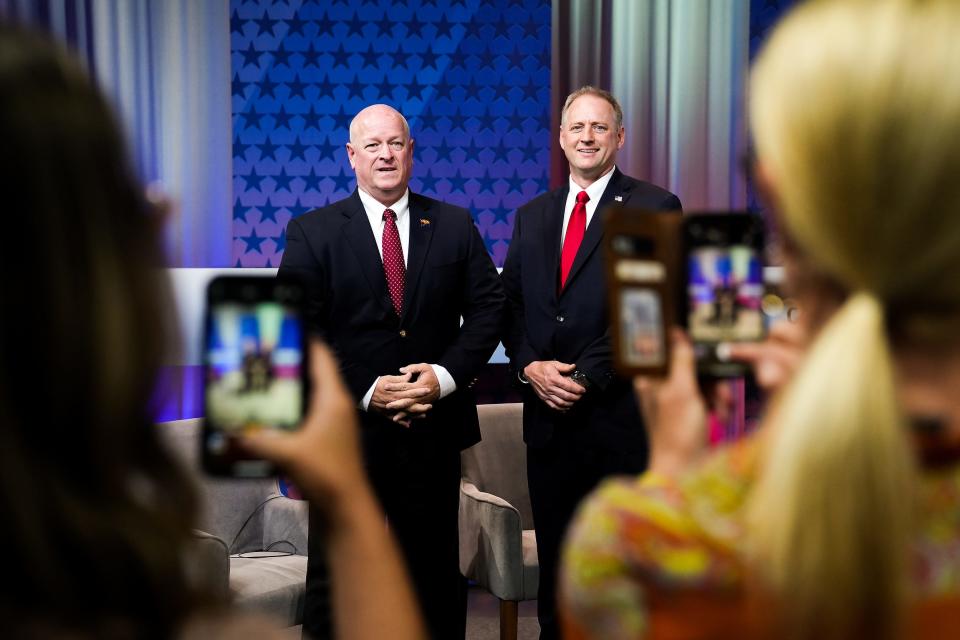
Myers and Thompson: Title 15 of the Arizona Constitution sets forth two overarching responsibilities of the Arizona Corporation Commission with respect to the regulation and oversight of public utilities: to protect consumers through the setting of just and reasonable utility rates, and to ensure the utility grids remain reliable and stable. It is incumbent on the ACC to ensure the public utility proposes and constructs the most reliable form of electric generation at the most affordable cost. In 2021, 99% of Arizona’s total electricity generation was provided from six sources: natural gas (43%), nuclear (28%), coal (13%), solar (9%), hydroelectric (5%) and wind (1%).
When the government mandates electric generation types and forms, it becomes a direct contradiction to the Commission’s responsibility to protect consumers. To illustrate, we need only to examine the consequences of the 2006 Renewable Energy Standard and Tariff (REST) rules promulgated by the ACC to require 15% of electrical generation be derived from renewable sources by 2025. Pursuant to that mandate, the ACC forced Arizona Public Service to enter into a 30-year contract at an uneconomic rate of over four times the cost of electricity generated from natural gas. Seven years later APS customers are still paying for that, and will continue to do so until the year 2045.
Mandates result in cost shifts which unfairly and improperly burden working families. They drive up prices, and also result in the accelerated application of technology before it is cost-effective with proven reliability. As Commissioners, Kevin Thompson and Nick Myers will faithfully uphold their constitutional charge to protect Arizona’s rate payers by supporting all forms of power generation — whether nuclear, natural gas, hydroelectric, wind, solar, or hydrogen — and ensuring that the least cost power generation is approved that will protect the reliability of the electrical grid.
'We're going to hang you': Man charged in threat against Arizona election officials
Kennedy: Yes, Arizona’s overdependence on natural gas is a problem. We replaced one dirty fossil fuel with another by switching from coal to natural gas, and the recent spike in natural gas prices has hit Arizona ratepayers hard as a result. While the climate and health benefits of renewable energy have always been clear, we now live in an era where solar and wind are also the best financial deal for ratepayers, by far. It is a Commissioner’s duty to ensure utilities do what is right for ratepayers and for the advancement of Arizona, otherwise they will simply do what benefits utility investors and is easiest.
We have more than enough proof, solar should be the centerpiece of our energy system complemented by energy storage and wind, with existing nuclear and natural gas filling in gaps as storage technologies develop. We also must reassert Arizona’s leadership position on energy efficiency that we have lost in recent years.
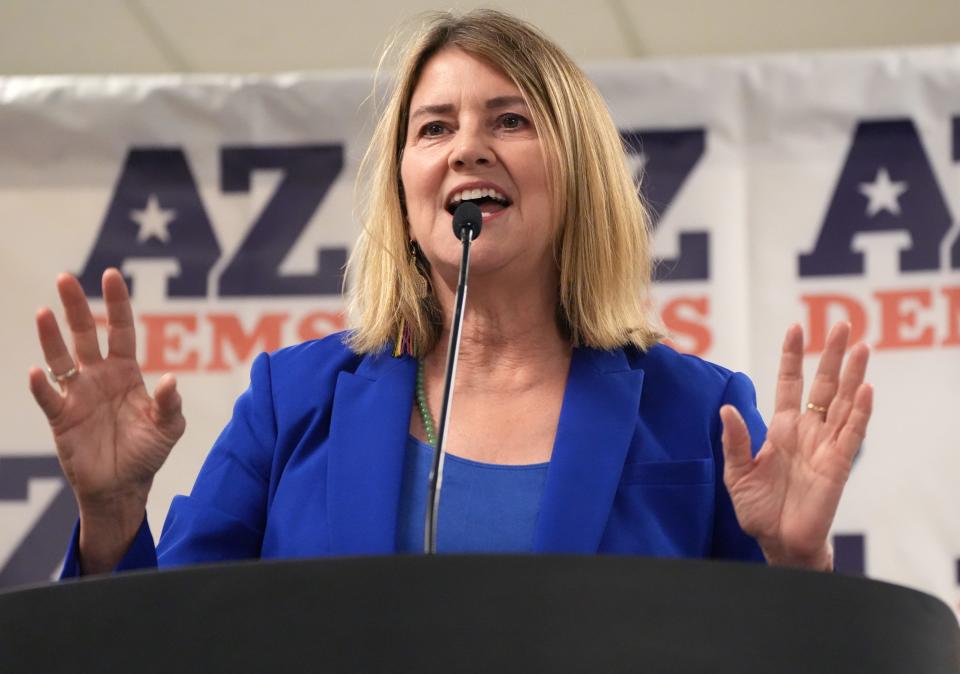
Kuby: Commissioner Kennedy and I are strong proponents of setting renewable energy (and energy efficiency) requirements for utilities, while our Republican opponents would like to eliminate these rules, wherein consumers can hold the utilities accountable. Those rules, established in 2006 have resulted in over $2 billion in savings for consumers, 14 power plants avoided and 23 billion gallons of water conserved.
Natural gas (also called fossil gas) is the dominant energy source in Arizona (43% of our electricity generation) and is imported into Arizona from Texas and New Mexico. In addition to costing more than solar, fossil gas shows extreme price volatility due to climate change (look to Texas) or geopolitical conflict (look to the war in Ukraine), making it a risky energy source purely from an economic standpoint. And lest we forget in this time of water scarcity, gas plants guzzle water and threaten our water supply.
We can no longer ignore the adverse health impacts of fossil fuel powered homes. Research shows that fossil fuel machines leak harmful toxins into the air at all times — even when they’re not being used — including carcinogens like formaldehyde and benzene. A gas stove in your home is the equivalent to living with a smoker. Why invest in a source of energy proven to be toxic and volatile when we have clean, safe, cheap alternatives?
Lastly, gas is also transmitted through pipelines that require costly maintenance and are massive public safety risks as these gas lines run through every neighborhood.
The economic, health, and public safety arguments against fossil gas are too strong to ignore.
Rates for small water companies
Q: Arizona has approximately 300 small water companies and they often get into financial trouble and need to increase rates dramatically to address needed repairs. Is there a solution to these small water company problems that Corporation Commissioners can enact?
Kuby: The majority of utility rate cases that come before the Commission involve setting non-municipal water rates and establishing rules and regulations for their operation. There is no one solution to the historic drought, but the conversation (and the action) must begin with conservation.
The Commission must take a more active approach to regulating these monopoly utilities by bringing them before the Commission before there is a crisis. Many of those utilities have not been before the Commission in years and to regulate these companies, the Commission first needs to understand their needs and challenges. The Commission needs to ensure that the water companies it regulates are responding appropriately to the historic drought, especially those who either operate outside of Active Management Areas or rely upon the Central Arizona Groundwater Replenishment District.
There are a host of water-conservation practices piloted and perfected in Arizona cities that small water companies could adopt. These cities demonstrate that incentivizing customers to conserve water, especially use of outdoor water, results in cost savings to customers and utilities alike. Inexplicably, our Republican opponents are opposed to utilities offering rebates.
Transitioning to clean energy will result in substantial water savings. Coal-powered plants use tens of millions of gallons of water each day. In addition, Arizona’s combined non-renewable energy production (nuclear included) uses more water than the city of Tucson uses each year. Solar plants use only 1 to 2% of the water that fossil fuel plants consume.
Myers and Thompson: Historically it takes over 18 months for a water utility to file and seek approval for capital expenditures in the rate-making process. It is a very costly and burdensome process, leaving many of the mostly smaller water companies unable to come before the commission to obtain rate increases in order to fund capital improvements in their infrastructure.
Kevin and Nick recognize that this current process does not serve our smaller companies well, and that it has resulted in many utilities experiencing upwards of 45% water losses across their systems. Especially now that Arizona has entered Tier 1 drought conditions and is expected to enter Tier 2a conditions in January 2023, it is imperative that the Commission improves the efficiency of their rate-making processes so that these smaller companies are able to seek the needed capital to improve their systems.
This will also help ensure that the consumers do not see rate spikes in their utility bills that are the result of infrequent rate filings. In addition, the savings from improving the Commission’s rate filing process can be passed along to the consumers instead of further compounding their utility bills.
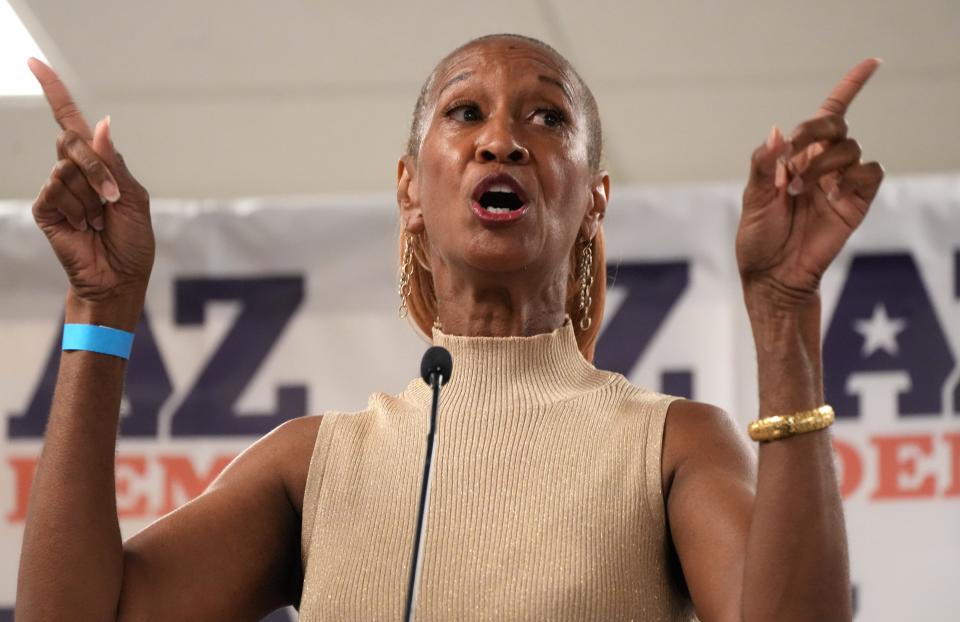
Kennedy: Our first priority should be ensuring existing water customers do not subsidize the expansion of water service into areas that cannot economically pay for their own growth themselves. Customers who choose to move to areas that are difficult to serve or have limited water supply may face a higher price for water. I will fight for every customer to ensure fair rates.
Coal plant closures
Q: Can you explain your position regarding the communities in Arizona that have lost or are going to lose the coal plants that are central to their economies? If these communities are due compensation, where should that come from? If they are not due compensation, can you explain your thoughts on why?
Kennedy: Our state’s transition to clean energy is reducing rates for ratepayers, creating thousands of new clean energy jobs, and resulting in immeasurable environmental and health benefits both today and for many generations. However, these benefits are widespread, while negative impacts of the transition are highly concentrated in places like St. Johns, Joseph City, Round Valley, Page, Kayenta and on Black Mesa.
The utilities overseen by the Commission supported an extractive coal industry that made promises it never kept, withdrew precious groundwater to support its operations, and left behind degraded landscapes and in some cases forced communities to haul water to maintain their way of life. On Black Mesa on the Navajo Nation the jobs are now gone but the springs have not returned.
The utilities seem to find millions of dollars readily accessible to spend on lobbyists, politics, and ad campaigns. They can do much more to help these communities find an economic footing.
Debate recap: Help for coal communities, renewable energy debated by candidates for Arizona Corporation Commission
Kuby: At our recent Clean Elections debate, our Republican opponents argued that the Navajo and Hopi nations should apply for “foreign aid,” a shocking rebuke to Native American communities who have powered our state for decades while their aquifers were drained, rivers polluted, and land degraded. The cities of Page, Springerville, Joseph City and St Johns face similar challenges, yet our opponents equate community investment with “a bailout.”
For our Indigenous and rural communities to thrive, the Corporation Commission should have a process that governs utilities when they shutter coal plants. A “Just and Equitable Transition” should be part of any plant decommissioning process, and we need utility and state investment for those communities suffering disruptions from plant closure.
Coal plants can be the largest employer in a region, and plant closures can devastate the towns and counties that host them. Over decades, supportive economic, social, and other systems were structured around energy resource production and generation in rural Arizona. When plants close, tax revenues precipitously decline, schools close and unemployment skyrockets. It is a stain on our state that over 70% of all the unelectrified homes are in the Navajo Nation, when they were home to the largest strip mine in the US.
Investment in a Just and Equitable Transition must be shared, but it should begin with the Investor Owned Utilities (IOUs) who profited so handsomely. Ultimately, the entire state must invest, as we all have benefited from the extraction of resources to grow our cities.
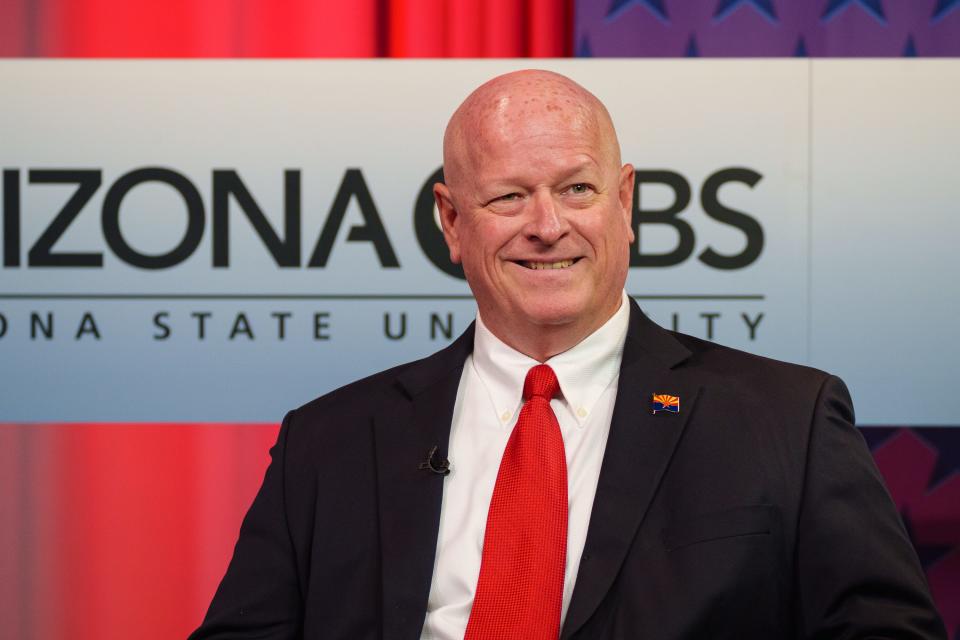
Myers and Thompson: It is unfortunate that good paying jobs will be lost by the forced closure of coal-fired power plants as the result of Obama-era EPA rules. Kevin and Nick believe that all forms of electrical generation should be considered for power generation, and regrettably these baseload generating plants are being forced to close because of excessive environmental overregulation which is driving up costs to operate.
Any consideration to use ratepayer funds to give subsidies to these communities would be unjust and unreasonable on working class, fixed and low-income families in Arizona. Kevin and Nick would rather see the continued employment of the local community by transitioning these plants to bio-mass, hydrogen or other emerging technologies such as micro nuclear that would take advantage of the existing infrastructure and skilled labor.
Ensuring a reliable power grid
Q: As a Corporation Commissioner, how would you ensure that Arizonans are not on the brink of rolling blackouts as California was for several days this year? What does Arizona need to do to ensure reliability in the power grid and what would you do to promote that action?
Myers and Thompson: Avoiding blackouts like California has experienced is simple: we do not California our Arizona energy! The lessons to take away from the causes of the California and Texas blackouts is that putting all of your proverbial energy eggs in one basket is too risky.
The over reliance on renewables in those states has created an unreliable and unstable electrical grid. Power from intermittent sources such as renewables needs storage solutions to make them more viable so that our grid remains stable. California currently produces 65% of its electricity from renewables as the result of their renewable energy mandates — and that comes at a high price. Not only do they have the highest priced electricity in the nation, but they also have increasing rolling blackouts as a result of this lopsided policy.
One can clearly see that on days with a high demand, like we have seen over the last few weeks, that the high reliance on solar coupled with the lack of long-term battery storage has resulted in rolling blackouts and brownouts. In fact California has seen a 20-30% increase in blackout events year over year, with the reported number of blackout events this year alone to be on track to exceed 25,000!
As we have been out on the campaign trail, the citizens across Arizona have told us time and again that they expect Arizona to have a reliable grid at an affordable cost. That is also in alignment with the Arizona Constitution. We believe Arizona needs to have a broad portfolio of generation types, including renewables, nuclear, natural gas and coal to ensure our energy grid remains reliable and resilient.
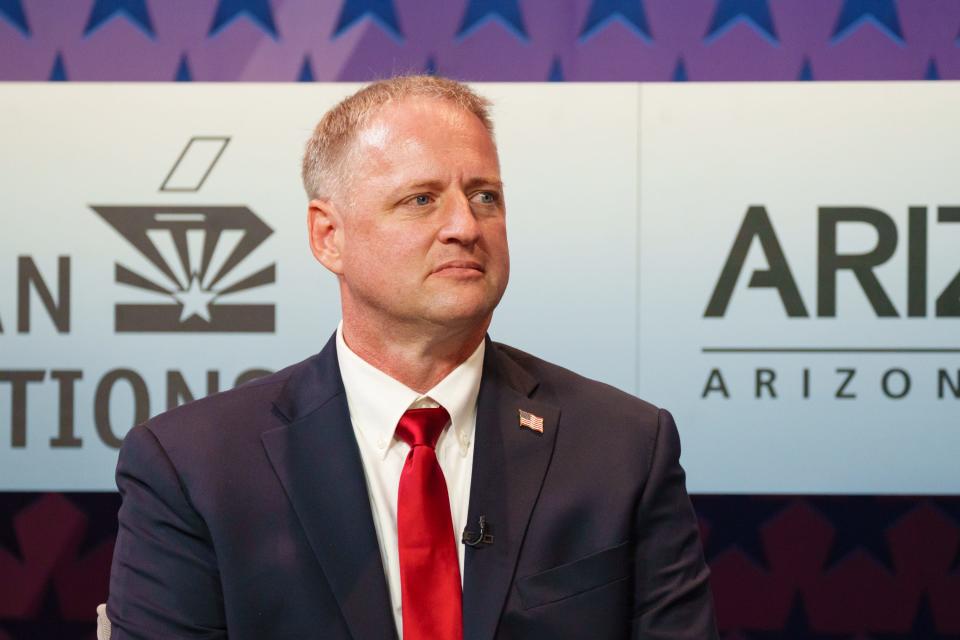
Kennedy: Accelerating the clean energy transition while ensuring grid reliability is the paramount challenge before the Commission. The path forward involves several policy steps:
Greater rewards for utility customers who take an active role through actions such as adjusting thermostats and other appliances during times of grid stress and installing “distributed energy resources” such as battery storage, energy efficiency, and solar. Customer participation in the grid-of-the future is imperative.
Regional collaboration in planning and deployment of transmission and generation.
A nation-leading community solar program to allow more generation resources to deploy quickly.
Kuby: We are not California and we are not Texas, which is largely unregulated and suffers from only 2% solar in their energy mix. The State of Arizona, in fact, is uniquely poised to lead the transition to a clean energy economy.
Currently natural (fossil) gas is 43% of our energy mix and we import this dirty fuel mostly from Texas and New Mexico.
To ensure reliability, we need to transition to a clean energy system that is less reliant on imported energy and builds upon one of Arizona’s greatest resources — the sun. Expanding the solar capacity of our state — the sunniest state in the nation — and embracing distributed generation of solar would build more resilience into our energy system and lower costs for consumers, as solar is cheaper than coal and cheaper than natural gas.
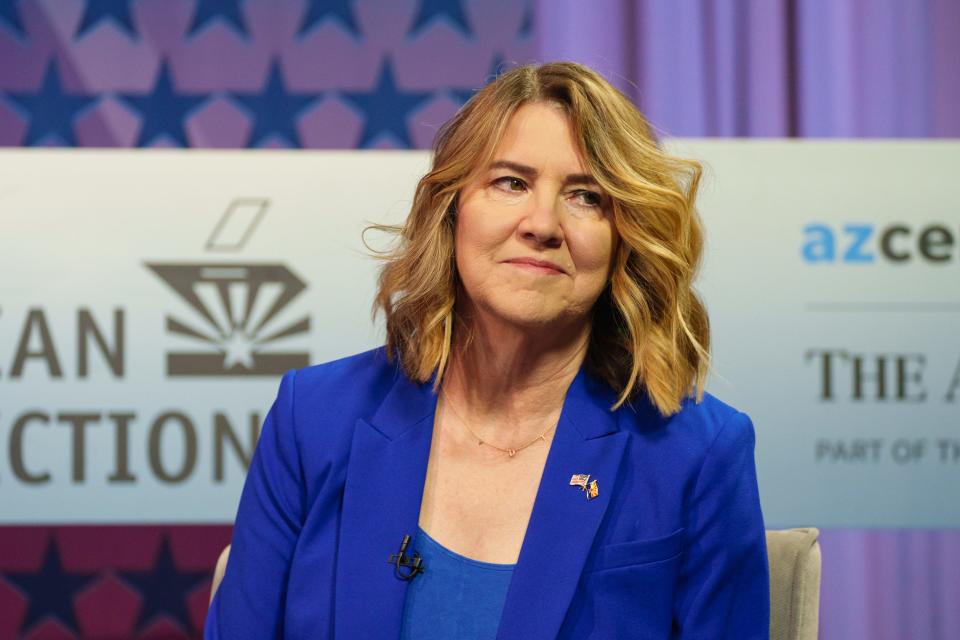
Large scale solar as well as distributed generation must be coupled with the expansion of battery storage adoption — a goal that is not out of reach as it was even five years ago thanks to massive investment in battery technology.
Historic federal investments from the Inflation Reduction Act (IRA) will help us to update our grid and empower the least cost energy resource — energy efficiency.
Last year, the Commission failed to update the energy efficiency rules that would have required regulated utilities like APS to achieve 35% savings by 2030 through new programs that include traditional energy efficiency projects, demand response, and innovative technologies. Arizonans lost out on enormous opportunities to manage demand to avoid blackouts, save customers billions of dollars and improve public health outcomes.
The Commission needs to revisit those rules and do the right thing for the people of Arizona. Unfortunately, the Republican candidates oppose utility rebates for consumers, even though every dollar invested in energy efficiency returns $4 in cost savings and enables utilities to manage demand when power needs spike.
Court ruling: Arizona Supreme court says lone regulator can seek utility documents
Affordable electricity rates
Q: How will you balance affordability for consumers while ensuring public service corporations provide reliable service?
Kuby: Distributed solar generation leads to reliability. When energy is generated at the same place it will be consumed, it means there is little room for failure in transmission lines. Solar energy is also cheaper to generate than any other source of energy, which will lower costs for ratepayers.
Our opponents' claim that clean energy, specifically energy efficiency, renewables and storage is expensive is a decade out of date. Even before the massive investments of the IRA and the Infrastructure Investment Jobs Act (IIJA), energy efficiency and renewable energy plus storage have been the less expensive options.
There are many opportunities for utilities to reduce costs to consumers beyond lowering rates. These opportunities include removing late fees for people who fall behind on their bills and must choose between powering their homes and feeding their families, energy efficiency rebates and weatherization programs to lower a ratepayer’s overall bill, and incentivizing water conservation.
Myers and Thompson: The Arizona Constitution is pretty clear that the Commission’s job is to ensure a reliable energy grid while protecting the consumers. Going back to question one, mandates from the REST rules have forced the utilities to invest more in renewables than in traditional generation. Again, we need to eliminate mandates and put the onus on the utilities to make the just and reasonable investment that will keep our grid reliable and costs affordable.

Kennedy: Reliable service is essential to the safety of customers and to our economy. The Commission is obligated to only allow into rates utility facilities that it deems were prudently invested and are “used and useful.” I will fight to ensure any utility spending that does not meet this standard is not allowed into rates.
Common misconceptions
Q: What is one misconception about utilities or utility regulation that you commonly hear among voters?
Kennedy: Many voters are not aware of the enormous amount of water used in fossil fuel power plants in the making of electricity by boiling water to create steam. In a moment of water crisis and when water-conserving alternatives such as solar and wind are cheaply available, the time is now to chart a new path.
Kuby: What I hear from voters are not so much misconceptions, but a general lack of awareness about the Corporation Commission and its unique executive, legislative and judicial functions. As I travel the state, voters are surprised to learn of the Commission’s powerful impact on their everyday lives. I explain that the Commission is a public utilities commission, even a consumer commission; that Arizona is 1 of only 13 states where commissioners are elected, one of only seven states where the Commission’s powers are embedded in the Constitution, and that Commissioners serve the people of Arizona, not the monopoly utilities.
Myers and Thompson: As we travel across Arizona and meet with the citizens, many don’t fully understand what the Corporation Commission does. Also, it is confusing to many folks about the difference in public utilities versus municipal-owned or even that the ACC has no regulatory oversight of SRP. Some also believe the Commission controls water policy in Arizona when in actuality the ACC only regulates the water utilities’ transportation of the water from the point from which they acquire it to when they deliver it to your home or business.
The ACC does, however, have responsibility to ensure the water companies have appropriate sourcing and backup solutions for sourcing, that they are adequately maintaining their infrastructure and that they are using the just and reasonable option available to them.
Why voters should pick you
Q: Can you say in one sentence why you would be a better utility regulator than your opponents from the other political party?
Myers and Thompson: Kevin and Nick bring a combined 30+ years of real applicable utility and regulatory experience to the Commission, at a time when experience matters the most. It is not enough to be a political ideologue with no understanding of the practical realities of producing and delivering energy and water, nor the regulatory oversight experience to hold companies accountable. Kevin and Nick won’t gamble Arizona’s energy future on political ideology!
Kennedy: I am a staunch consumer advocate who realizes we have a water crisis to tackle and an opportunity to lead the country in renewable energy, however, my opponents feel the Commission should take a passive role and let for-profit utility companies decide the direction of the state.
Kuby: I have a proven track record of putting aside partisan politics to work for the public interest and will move our state forward toward a clean-energy economy when we need it most, while my opponents represent utility interests and aim to move us backward while denying basic science and economics.
Reach reporter Ryan Randazzo at ryan.randazzo@arizonarepublic.com or 602-444-4331. Follow him on Twitter @UtilityReporter.
Subscribe to azcentral.com today.
This article originally appeared on Arizona Republic: Arizona Corporation Commission: What GOP, Democrat candidates would do

